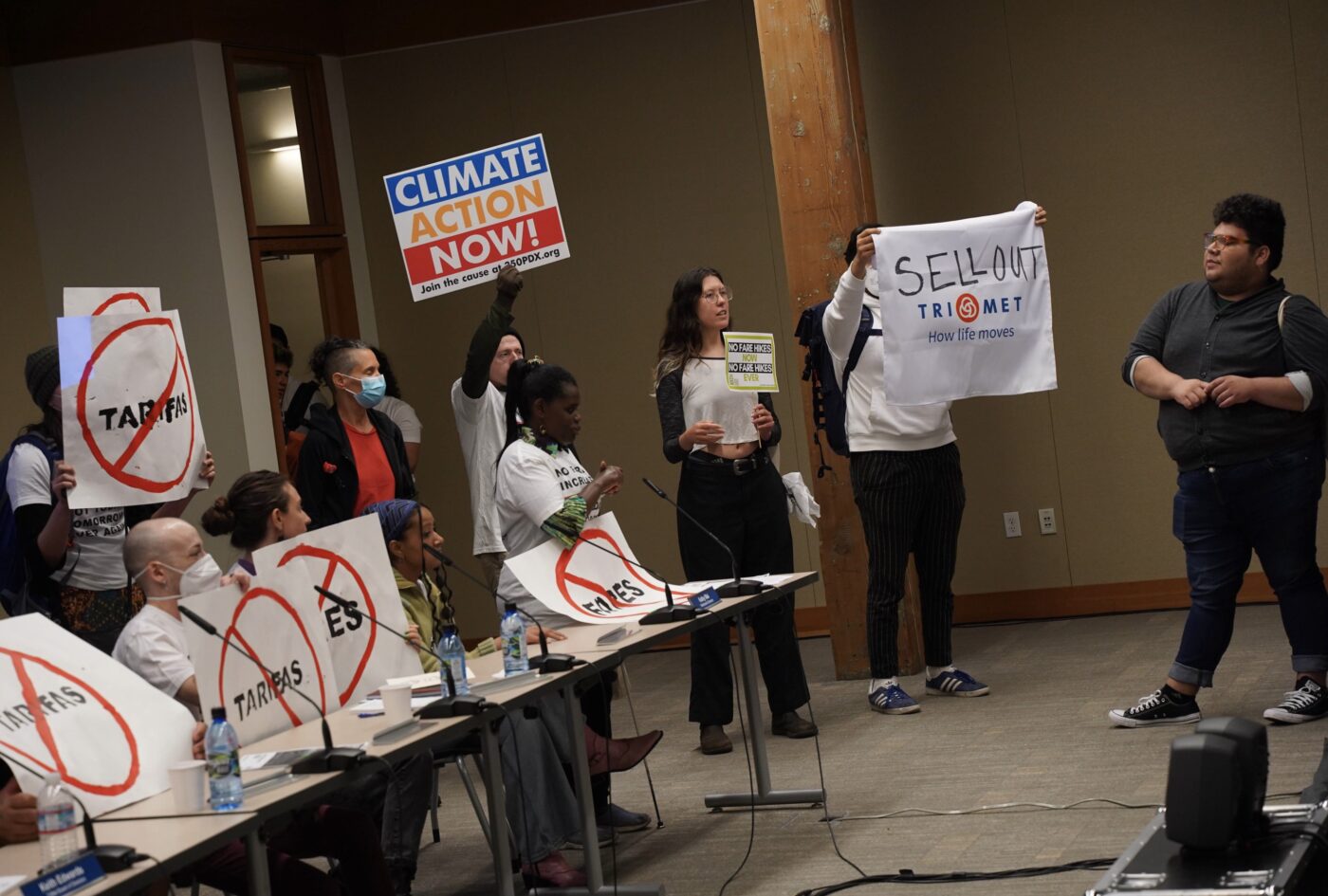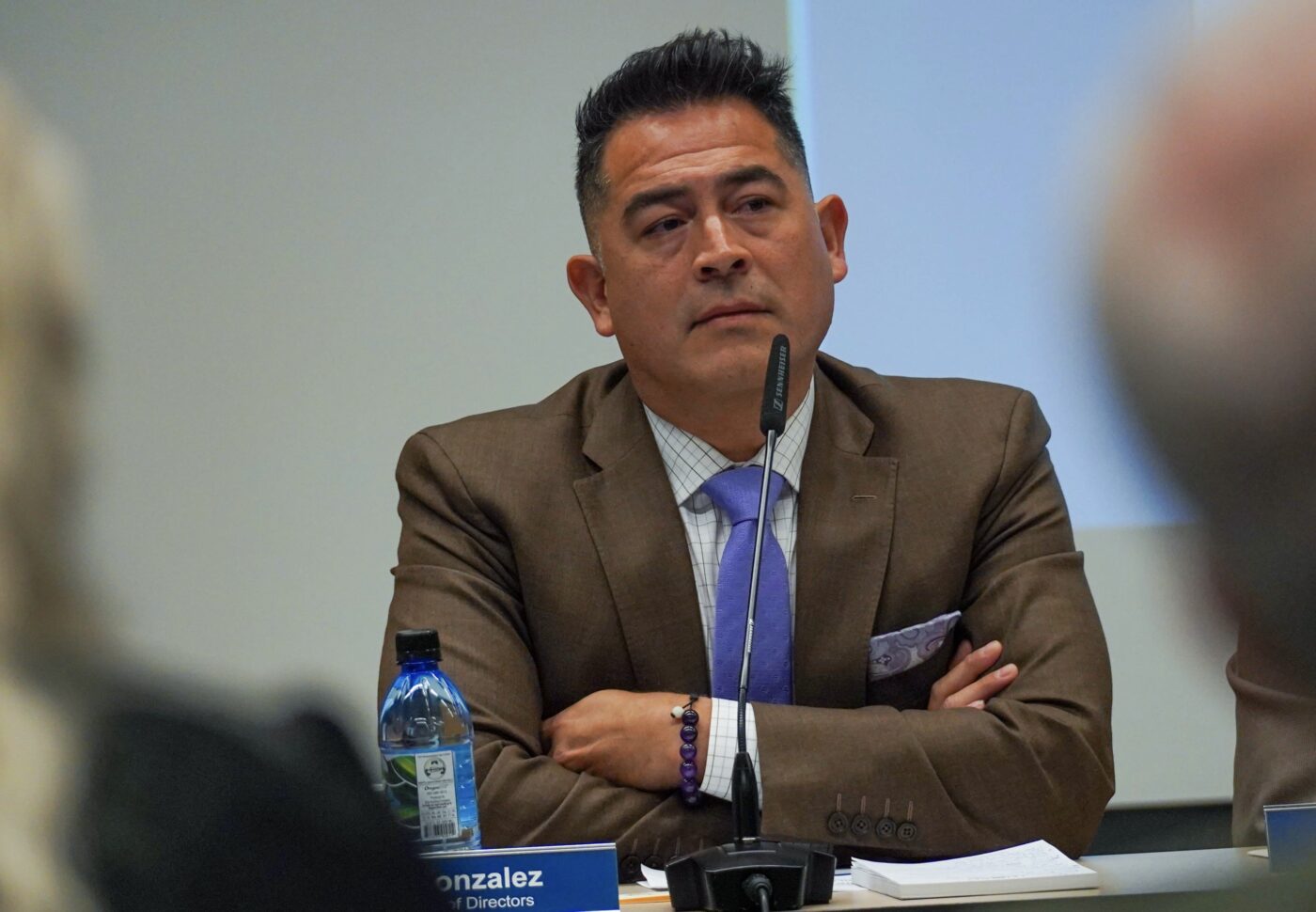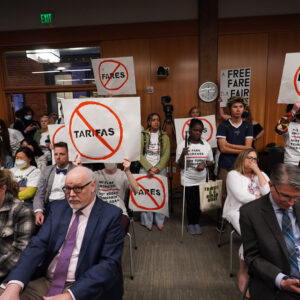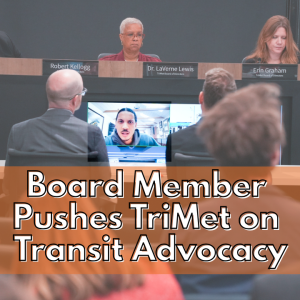“I get scared that they’re creating a pathway where any organization with a 501(c)(3) status can start utilizing programs to crowd out a public forum with a position.”
– Ozzie Gonzalez, TriMet Board member
A member of the TriMet Board of Directors has doubled-down on serious allegations against a Portland-based transit advocacy nonprofit that were first made public at a board meeting last month.
TriMet Board Secretary and Treasurer Ozzie Gonzalez was appointed to his position by Oregon Governor Kate Brown in 2018. Late last month he voted along with five other board members to raise transit fares by 30-cents. Before doing so, Gonzalez delivered a speech about why he believed the fare increase was the right move. He also went out of his way to sharply criticize OPAL Environmental Justice Oregon, a nonprofit that organized a rally and protest against it.
Gonzalez expressed not only his disagreement with OPAL’s advocacy style, he accused them of tokenization, of paying people to testify, and he directly questioned whether their tactics ran afoul of nonprofit lobbying rules. “We’re confusing democracy by having paid advertising brought to the public forum,” he said during the meeting. “And I believe that anybody who’s a tax exempt organization needs to be very careful when they’re leaning into tax policy in this way.”
Gonzalez then expanded his criticisms in tweets from the bus on his way home from the meeting:
“It’s a dark day for democracy when special interests pay people to disrupt meetings. Buying t-shirts, making signs, paying stipends, & Tokenizing youth, POC [people of color] and disabled people for political gain is gross! And many [of the meeting attendees] were paid over $700 a pop to show up and make a spectacle for cameras being told this will affect them. Low income riders and frequent riders are now getting a BIGGER subsidy, but truth matters little to paid activists looking for a spectacle.”
These accusations are based on what Gonzalez saw and heard at TriMet’s board meetings in April and May. His assertions about people being paid comes from OPAL’s Seeding our Liberation program. That 12-week leadership development program (which began in March) paid participants $2,160 over three months ($720 per month) and required them to attend weekly educational workshops and testify at three TriMet board meetings (the last one being the fare increase vote on May 24th). Participants were also required to testify and/or take part in some sort of activism effort at least four times in the three months.
Given a chance to respond to Gonzalez’s tweet, OPAL wrote to BikePortland via email: “We find the accusations Gonzalez made immediately after the TriMet Board Meeting deeply disturbing and unfounded. We view his tweet as trolling and we do not feel it is necessary to respond to this behavior directly.”
OPAL has pushed TriMet for a fareless transit system for years. In 2019 a few TriMet board members appeared to briefly consider the idea; but there’s never been support for the idea from TriMet’s top leadership. For his part, Gonzalez says he agrees with OPAL that a fareless system would be ideal (he often frames the issue as “our cause”). What he objects to is how OPAL goes about making it happen. The way Gonzalez sees it, OPAL is more concerned with “trying to get a base riled up” than making progress.
In a phone call after the May 24th meeting, Gonzalez said OPAL has had many opportunities to help TriMet achieve lower and/or free fares. “For years I’ve seen OPAL present demands at the [Transit Equity Advisory Committee, TEAC], then utilize it to say nothing when it’s time to discuss ideas and solutions,” he said. “There’s an overwhelming emphasis on making sure that the pageantry looks like they’re championing a cause; but when it comes time to do the work, and actually affect the change, that’s not quite as important.”
Central to Gonzalez’s beef with OPAL is that they are a partner of TriMet. He says the group is paid to sit on the TEAC and to help the agency do community outreach (I’m working to clarify the nature of this financial partnership and will update this post when I learn more). “If you’re paid by an organization and you’re helping lead demonstrations where the premise is disruption, I would certainly like to have them come and explain how that will help advance our goals.”
“The heckling at the meeting this month was coming from voices [leaders of OPAL] that chose not to speak up during the public forum and have chosen to stay silent when they’re sitting in the committee meetings that are discussing this topic,” Gonzalez continued. “To me, this is the misuse of a process and the overwhelming emphasis on pageantry and optics.”
That OPAL might be running afoul of federal tax law that puts their nonprofit status in jeopardy is Gonzalez’s most serious accusation. Nonprofits are allowed to do some lobbying, but they can lose their tax-exempt privileges if it becomes a “substantial” part of their work. OPAL’s work on the fare increase appears to fit the definition of lobbying laid out by the IRS, but it’s unclear if the money and time spent reaches the “substantial” level.
“It doesn’t feel to me like they are acting within those [legal] confines,” Gonzalez told BikePortland. “And I get scared that they’re creating a pathway where any organization with a 501(c)(3) status can start utilizing programs to crowd out a public forum with a position.”
As for his claim of tokenization, Gonzalez accused OPAL of “throwing folks into a process that they have been under-informed about” and not giving them complete or accurate information about the issue. At the two most recent board meetings about the fare increase, Gonzalez alleges that, “Over half of the testimonials were coming in with a script in hand from an organization that that facilitated their arrival to that space.” (OPAL says a majority of people who testified were not affiliated with their organization.)
“Right now it feels more like our partners want to see us fail, then they want to see us succeed,” Gonzalez said at the May board meeting. Now he’s questioning whether or not TriMet should have any relationship with OPAL at all. “I don’t think they’re benefiting the cause in the grand scheme of things,” Gonzalez shared with BikePortland. “Right now, there’s just a lot of distrust and disregard for the transit system and the transit agency at-large that’s been cultivated and I don’t understand what the objective of that could be.”
I gave OPAL another opportunity to respond to what Gonzalez shared with me on the phone, but I have not yet heard back.
In their statement responding to Gonzalez’s tweet, OPAL said, “The [fare increase] vote demonstrates that the un-elected TriMet Directors are comfortable operating undemocratically in their decision-making process and moving forward with policy that inherently makes accessing and using transit in Portland more burdensome.”
Note: In a sign that this feud between OPAL and TriMet goes beyond Gonzalez and the board, this morning I received an email from TriMet Director of Communications Roberta Altstadt. Totally unsolicited and in response to our podcast, she wanted to make sure I’d seen Gonzalez’s tweet and she shared a link to OPAL’s Seeding our Liberation program website to back up his concerns.









Thanks for reading.
BikePortland has served this community with independent community journalism since 2005. We rely on subscriptions from readers like you to survive. Your financial support is vital in keeping this valuable resource alive and well.
Please subscribe today to strengthen and expand our work.
Shorter Gonzalez: “I can’t imagine why anyone would oppose a fare increase. The only conceivable reason anyone could testify against it would be if they were paid to.”
To state this argument is to refute it. You can disagree with their goals and tactics all you want, but Gonzalez statements are ridiculous. He should focus on the substance of the argument rather than engaging in evidence-free conspiracy theories.
Gonzalez didn’t say anything close to that, so it seems unfair for you to insinuate that in a summary “quote”.
Unless you can provide a quote, that is.
That sounds… completely founded? I guess we can both agree that the accusations are disturbing, though. Non-profits are not supposed to be focused on political influence.
The statements don’t seem ridiculous on their face and don’t seem to be based on any evidence-free conspiracy. In contrast, your use of quote marks seems to be designed to put words in Gonzales’ mouth that are not in this report and seem to be contrary to his position in his words that “Low income riders and frequent riders are now getting a bigger subsidy” after the vote. OPAL’s website expressly requires anyone availing themselves of the stipend to testify at three Tri-Met board meetings. That seems like direct payment for testimony at public hearings and seems to raise some potentially serious issues for OPAL’s non-profit status.
I am very encouraged to see that our public officials are pushing back on advocacy groups. Far too long have they been allowed to get away with egregious behavior because criticizing them would be “mean”.
I met Ozzie Gonzalez several years ago over coffee to discuss the 51 bus service. I was transportation chair of my neighborhood association at the time.
He was conscientious, open, and friendly. He made time to meet with me and another member of the transpo committee and listened to our concerns. It seemed to me like he took his responsibilities seriously.
An all around mild-mannered and reasonable person.
In the 2020 mayoral primary, I saw a very different person from what you’ve described. Even though Wheeler was mayor, Gonzalez seemed lightning focused on Sarah Iannarone. At the Revolution Hall debate, he kept sniping at her rather than Wheeler. It didn’t seem strategic and reeked of sexism. I know you and I have different politics, but I think if you follow him on Twitter, you’ll see what I mean.
As just one example, this is pretty gross.
Agreed. I remember that debate and I was absolutely not impressed with his performance. I think what we need to remember is that a lot of people in positions of power know how to be personable because that’s their job and because not being abrasive pays in terms of making it up the ladder (with some “modern presidential” exceptions). That momentary lack of abrasiveness doesn’t discount their other flaws including other moments of abrasiveness such as the mayoral primary debate.
Well maybe his “sniping”’at Inarone was related to her extreme political stances and divisive nature rather than her sex?
I’m not saying you are wrong about your impression, but every person is the sum of many complex parts. A person can be right about some things and wrong about other things. These situations are challenging because they require us to hold conflicting ideas in our heads at the same time, but it sounds to me as though González is right in this case about the perversion of the process.
We have different experiences with Ozzie Gonzalez.
aren’t lawyers paid when they testify at city / municipal meetings?
aren’t lobbyists paid when they do their work?
why does it matter if volunteers are paid or not?
shouldn’t people with skin in the game get paid for their time?
perhaps there needs to be an understanding that transit and bicycling are valuable and merit respect from board members, especially if they are increasing the cost of taking the bus.
You are correct about lawyers, surly, but they are clearly identified and trained as paid advocates; non-profit “interns” (or whatever they are called) are not. And it’s especially problematic when people give money to a nonprofit for certain charitable purposes and then those funds are used for other purposes.
“aren’t lawyers paid when they testify”
I’ve often thought that everyone testifying should have to disclose if they are being paid for their testimony, and by whom.
Definitely. I think there are some requirements, in some situations. But I don’t know if what I’m recalling was a requirement stated by a body (City Council, Design Commission, or whatever) or possibly a professional requirement for lawyers practicing in Oregon, versus a requirement of a review body.
Related to that, I agree with Fred that the fact that lawyers do (in my experience) always state who they’re representing when they testify does make their being paid to testify different than people paid to testify that don’t disclose that. And that’s also where I think Gonzalez may have a valid point.
Ironically, that reminds me of something I disliked about Gonzalez when he ran for office. He always called himself an architect, but he wasn’t registered in Oregon as one, and I remember not being able to find that he was ever registered anywhere in the U.S.as one. Having someone complain about people not disclosing they’re being paid to testify who calls themselves an architect but isn’t registered as one (and therefore can’t legally practice architecture here) is a bit cheeky to me.
As much as I lament that Ted Wheeler was reelected mayor in 2020, we definitely dodged a bullet in terms of Ozzie Gonzalez’s candidacy back then. We do not need conspiracy peddlers in any position of authority, and especially not mayor. “$700”? How damn specific! If he had any shred of evidence, he would’ve shared the smoking gun by now. That he didn’t share evidence says everything we need to know about his accusations.
The $700 figure is directly from OPAL’s website linked in this article for a three-month stipend totaling $2,160 expressly conditioned on requiring stipend recipients to testify at three Tri-Met board meetings. Doesn’t seem very conspiratorial and seems to be an arrangement that possibly threatens OPAL’s non-profit status.
Alright, so I missed that detail. But I’m looking at the website and it’s a 12-week leadership development program. Meaning while they do have to testify at three board meetings among a bunch of other things, what Gonzalez wrote makes it sound like OPAL picked up random people off the street and paid them $700 to testify and do nothing else. While it’s certainly not outside the realm of possibility that some of them just applied to the program for the money, it seems improbable given that it’s a full 12-week program to build leadership and organizing skills that includes this. I don’t know about you, but I would have a lot of trouble joining this type of thing if my heart weren’t in it. What Gonzalez seems to be insinuating (or at least what I read from what he wrote) is that people wouldn’t oppose a fare increase unless they were being paid.
Seems like requiring grantees to testify as a condition of receiving money is pretty specific. Not sure if that is illegal, but it does not have a good look.
I’m not a lawyer but I doubt it’s illegal. The real issue is that most people who are paid for their testimony disclose that and make it clear if they are representing their employer or not.
For example, the head of ODOT gets paid to testify all the time, and its a requirement of their job. But when they sit and testify for their job, they are presented as a representative of ODOT. If Kris Strickler is really passionate about water quality, he can still go testify for or against bills, but he can’t represent ODOT if they are just his personal views.
If the OPAL staffers represnted themselves as concerned citizens rather than paid attendees, I do think that’s at best dishonest. Paying people to take political action is a dark path that we need to tread lightly.
I’m not so sure completely fareless is a good idea anymore. A different set of riders come in and use it in ways unintended and detrimental to the service for all. And I am grateful to see security on the system to keep it safe for the vulnerable.
If Opal wanted better democracy at Tri-Met they would need to work at the state level to divest the appointment method to a district elected board.
If TEAC members are not contributing to the progress with actual solutions then maybe step aside and give space to someone who will.
Hollering and bullying at meetings is the quickest way to shut down democracy.
Democracy ? Where is that ?
Trimets own public feedback showed 99% against this
Agree – fareless seems like a good way to turn a decent public transit system into a mobile shelter. I have no problem with a fare increase. If I were on the fence, these activist shenanigans (“bullying” seems appropriate) would not convince me otherwise.
My experience as a frequent Trimet rider chimes with your comment, Dan. The other day a man carrying two huge plastic bags full of cans got on my bus. He said he could not pay his fare but the driver let him on anyway. He put down his bags in the wheelchair area and of course the bags went flying at the first turn and the cans were strewn everywhere. He then yelled and swore at the driver, who had to stop the bus to de-escalate the situation and allow the man to collect his cans. Other riders had to get involved to help this man, who was clearly so high on something that he barely knew where he was. The whole episode added about 30 minutes to what is otherwise a quick trip downtown on the bus – and unfortunately it’s a typical experience on Trimet nowadays: I’d say one in five rides has some incident with people in crisis that causes a delay or major stress for riders and the driver. I’m amazed anyone will still drive a Trimet bus and I always thank my driver profusely for sticking with it.
Or still ride one, or a train
There are losses to transit unrelated to the pandemic, having to do, as with certain cities tending to be run a certain “progressive” way, with crime and filth. In fact, those two words are being adopted together now quite a bit informally. Then there is the overlap where some were using transit but stopped for health and safety reasons to do with the virus, but perhaps with other health and safety reasons, the latter of which have teetered them to commuting or visiting by other means now, usually driving. It could be on a bike, as some have been able to appreciate for shorter trips in place of transit, and can be faster, too.
Local governments need to get out of the business of sending taxpayer money to nonprofits. Unfortunately local government here (Metro, Multnomah County, City of Portland, TriMet, etc) does not have the bandwidth to vet, oversee and ensure transparency, efficiency and effectiveness of the multitude of nonprofits we send money to. In my opinion, there needs to be a moratorium on all nonprofits gifting until appropriate and rigorous guardrails can be enacted.
You point to a giant problem. Non-profits have sprung up to do quasi governmental functions for decades. They provide services to the elderly, homeless, addicted, mentally ill, on and on. It is a non-transparent and fraught ‘business’ arrangement. As former head of a large, county agency, what it does is allow the county to ‘farm out’ services to a company with minimal oversight, much lower pay and benefits than civil servants. It is a ruse that allows county commissioners to wash their hands of many societal issues, by pretending that something is actually being done. If you examine their contracts there are rarely any clearly stated goals or expectations, and, as a result, little accountability and frequently, minimal results. These non-profits usually receive scrutiny only when they really screw up or get a bit too much media attention for comfort. Because they are called ‘non-profits’, the public assumes they are good, ethical people, with the best interests of society in mind. The fact is that, many (most) are self-perpetuating bureaucracies with salaries that would shock many working folks.
Wow, okay I changed my vote. This should be the “comment of the week”!
TriMet’s 30 cent raise is set to put Portland at close to the most expensive fare structure in the country. More expensive than San Francisco, Seattle, New York, LA, Boston, DC, Minneapolis, Chicago, San Diego – the list goes on. That alone should be enough to raise eyebrows, and it’s disappointing to see the TriMet board treat a fare raise as a fait accompli
San Diego is an illustrative comparison actually, both Portland and San Diego provide a similar number of transit rides (3.2m bus rides in San Diego vs. 3.1m bus rides in Portland in October 2022), they currently have a very similar fare structure ($2.50 one way fare – though San Diego is $6 day pass currently), and they are roughly equivalent in size (San Diego MSA is 3.2m vs 2.6m for Portland). Yet somehow TriMet has an $825 million operating budget vs. MTS’s $300 million. Just food for thought I guess
MTS subcontracts about half of its bus operations, which makes them look like they spend less on operations than the system actually requires. So they nominally have 800 operators (bus and rail) to TriMet’s 1700. Despite having a larger vehicle fleet. The other operators are on contractors books.
This is a patently false statement overall and false equivalency between fare structures and transit systems. Yes, LA has a pretty good fare and its thanks to thoughtful advocacy to get extra taxes to keep it low. In some cities cited, there are multiple systems that each charge. So if you take a bus and light rail or subway, you pay combined fares. Also, just about every system cited has a premium fare for certain services for limited bus service.
TriMet’s fares allow for travel in both directions and all modes and throughout the region while others are for shorter time period and typically only in one direction. Finally, we’re talking about 30 cents difference for adult fares and 15 cents for reduced income fares. I pass that much change laying on the street every day. How that is the end of the world like OPAL made it out to be is beyond me. Here’s some examples of adult fares only.
TriMet: $2.80 fare for any combination of bus, MAX, streetcar, commuter rail in any directions over the course of 2.5 hours. $5.60 all day fare
Seattle: King County bus: $3.75 fare. $8 daypass
Sound Transit Link: $2.25-$3.50 one direction, depending on distance.
San Francisco: Muni bus: $2.50-$3 depending on how you pay, good for 2 hours
BART: $2.15-$8+ dollars depending on how far you go
LA Metro: $1.75 one way fare, valid 2 hours
NY Metro: $2.75 one way fare
Boston: $2.40 one way fare
DC: $2 bus fare, $2-$6 metro fare, both one direction only
Chicago: $2.50 one direction, two hours
Excellent summary. The fare picture is much more complex (and honestly extremely frustrating) in most other cities. You can’t just jump from a Muni bus to BART, or a King County bus to Link light rail with the same transfer, which can make multi-stop trips much more expensive.
Adjusted for inflation, the new Trimet fares will be less than they were ten years ago. I actually think they should bump the cash fare up to $3 or eliminate cash fares altogether to speed up boarding. We have had HOP cards for 6 years now.
San Diego and Portland are very different cities.
It sounds like he may have a valid point (although the “paid $700 a pop to show up” sounds like an exaggeration unless the interns literally did nothing else for that money except attend the meeting).
But you also have to put his view in context. A few years ago, TriMet gave what I thought was a poorly considered construction staging lease to a major construction company doing work next to a TriMet rail r.o.w.
After getting nowhere talking to TriMet, I looked at contacting TriMet’s board. The representative for my district was Gonzales, who also worked for the contractor getting the generous treatment. So I didn’t bother contacting him, feeling it would waste my time.
The point isn’t that he did anything wrong–he didn’t–it was that public boards of all types–TriMet, design and planning commissions, task forces–are filled with people who work for large companies–contractors, design and engineering firms, lawyers, developers–who are paid to serve on the boards by their companies. The companies then have direct representation of their interests at the highest level. Getting representation on a board isn’t something that’s readily open to many people or interests.
It’s not uncommon for boards to be dominated by members working for (getting paid by) companies whose fortunes are directly tied to how the board votes. That’s why companies work so hard to get seats on them.
So while his comments have some validity, it also reminds me a bit of the dukes and earls complaining that the purity of the Olympics they competed in would be ruined by working class athletes getting paid a few bucks so they could train.
And then there are the lawyers and engineering consultants who’ve been paid thousands of dollars to research and testify for their clients, or establishment membership organizations who send out testimony samples to all their members and urge them to show up…
Comment of the week!
This “article” is disgraceful that’s all I have to say about it. Sticking up for the oligarchs now is Bike Portland ? Never thought I’d see that
Your use of the word oligarch is interesting from a power mapping perspective. Gonzalez clearly does not have the hundreds of millions to be an oligarch — although he may desire to be an oligarch someday. So where do the oligarchs feed into the power structure of Trimet? They are the funders of the democratic party, and specifically, of Tina Kotek who has absolute control over the Trimet board and every decision they make.
I just submitted this letter to governor Kotek.
I was disturbed and disappointed to read about TriMet board member Ozzie Gonzalez’s recent comments about the citizens who testified against TriMet’s fare increase. It should be obvious to any rational person that an 11% fare hike–whatever its merits–would be controversial and arouse a lot of passion. Rather than draw that obvious conclusion, Gonzalez engaged in baseless conspiracy theories, accusing OPAL Environmental Justice of paying for testimony. These are extraordinary claims that require extraordinary evidence; the only evidence Gonzalez offered was conjecture. Gonzalez is now accusing OPAL Environmental Justice of violating lobbying laws.
This is a clear and unambiguous case of a government official lashing out and potentially retaliating against private citizens and organizations for expressing their opinions on policy. His words, especially his barely veiled threats of legal retaliation, will have a chilling effect on citizens who wish to speak their mind about how proposed policies effect them.
Gonzalez is not an elected official. Voters have no remedy for his threats against their First Amendment rights. The only remedy is for you, the governor, to remove him and replace him with a new board member who is committed to upholding the peoples’ right to petition their government for a redress of grievances.
Nice letter, Karl, but I disagree with you. Now I need to get busy writing my own letter to Gov. Kotek, in which I will point out that González did a good job in raising a valid concern about a nonprofit’s use of funds to pervert a public process. Maybe it will motivate Kotek to convene an investigation into the status of not just this one nonprofit but all nonprofits.
I’ve gotta say that González seems to have a good point here. I’m especially troubled that a nonprofit program requires attendance and testimony at x number of Trimet board meetings in return for a stipend. It sounds like a kind of forced advocacy – the kind of thing you’d pay a lawyer to do. But these are not lawyers – they are mostly young people who don’t fully understand what they are advocating for. I agree with González that it seems wrong to “use” people in this way.
There’s nothing wrong with like-minded people getting together and organizing to testify and take a position on some issue. But when the organization is part of a paid program, run by a non-profit, that seems wrong to me. The point of testimony is to hear from the public, but when one organization takes over the testimony and drowns out other voices, they are distorting the process and increasing the chances that lopsided decisions will be made – decisions that will NOT benefit the public at large.
This whole effort to stop a very small fare increase was misguided from the beginning, in my view, and I’m frankly disappointed that BP has given it so much attention since it has very little to do with cycling. Any frequent transit rider (I am one) can tell you that buses are already free for any person who steps on the bus and makes noises about not being able to pay. The 30-cent fare increase will be paid by those of us who can afford to pay.
Get off my lawn, young people!!1!!!!!!!!
Cheap mischaracterization
Not only of the young like that but those older, who should both know and be better
It’s not limited to transit or to bike-related general-purpose activism, but includes the climate movement and its increasing portion of cranks and worse (Extinction Rebellion, hand-gluers and self-handcuffing performance enthusiasts, vandals, and worse). That movement never was only about the climate, same with a lot of the kids of various ages and anti-car activism and related matters. Humanity’s shame
Really tired of people who get appointed/ elected to influential positions, make no progress, and then throw petty tantrums about how hard their jobs are and put their energy into fighting with critics.
I just don’t understand what kind of solutions Gonzales thinks OPAL should be presenting at meeting that he couldn’t think of. The demand is pretty straight forward and uncomplicated. They want reduced, free, or at least not increased fare. He’s being disingenuous if he acts like he didn’t know that ahead of this vote. He’s also being disingenuous by acting like he doesn’t know where the money should come from. If he’s being honest and he thinks there is no way to raise money, he could just come out and say that. But he’s hiding behind these nonsense accusations instead. What a coward. At least have the guts to say what you believe.
Concern-trolling aside, Ozzie is actually incorrect on multiple points regarding the IRS regulations on 501(c)(3) lobbying.
First, the “substantial part” test is one way that nonprofits can measure their lobbying activities, but many organizations engaged in advocacy elect to use an expenditure test under section 501(h) instead. Lobbying expenditure limits are generally proportionate to the size of the organization’s “exempt purpose expenditures”. This means that a nonprofit can fund staff/intern time for lobbying as long as that spending doesn’t exceed the limits the IRS has specified based on what’s spent on the rest of the nonprofit’s activities. OPAL’s most recent public 990 form indicates they’ve been using the expenditure test. Based on the size of their organization, it’s highly unlikely that their spending on the SOL program would exceed the legal lobbying expenditure limits for their organization. If Gonzalez is worried about their nonprofit status, he can breathe a sigh of relief.
Second, despite appearances, it’s unlikely that advocacy around the actions of the TriMet board counts as lobbying for the IRS’s purposes at all. This is a bit more case-by-case since the IRS has not published a specific standard for who exactly they consider to be a legislator. However, Bolder Advocacy and the Alliance for Justice are reliable resources for nonprofit lobbying guidance in my experience, and they advise that members of local “special purpose bodies” (e.g. school boards, housing authorities) are generally not considered legislators in this context. The fact that the TriMet board cannot act outside of the legal framework or authority granted by the Oregon state legislature would further indicate that board actions would not trigger lobbying regulations as far as the IRS is concerned.
There’s complexity here and still some grey area in the law, but however you feel about how OPAL is approaching their advocacy, I think it’s fair to say that Ozzie doesn’t know what he’s talking about on this front. His claims are worth a more skeptical look in future reporting.